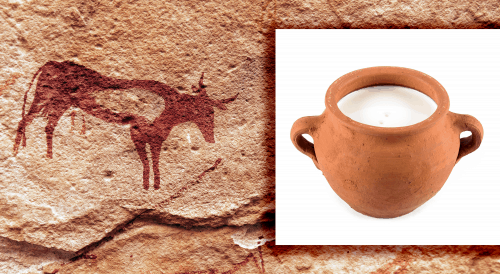
15 Mar Scientists Prove Human Ancestors Drank Milk
Scientists have spent decades studying ancient paintings on cave walls that depict animals being milked in an attempt to find evidence of dairy consumption. They have even found traces of dairy fat in pots. But scientists have never been able to determine if one specific human ate or drank dairy until now.
Modern technology has recently allowed archaeologists to test ancient remains for proteins specific to milk, and they can even tell you which animal the milk came from!
 But how? You guessed it. By their teeth! Archaeologists have removed hardened dental plaque, called calculus, from our ancestors’ teeth and test it for these proteins. Fortunately for us, many ancient people didn’t brush their teeth. Unfortunately for our ancient ancestors, the lack of proper oral care coupled with the sugars naturally present in dairy probably meant a lot of tooth decay and pain. Over time, plaque built up on their teeth and hardened into calculus, locking in the dairy proteins and preserving them for us to find six thousand years later.
But how? You guessed it. By their teeth! Archaeologists have removed hardened dental plaque, called calculus, from our ancestors’ teeth and test it for these proteins. Fortunately for us, many ancient people didn’t brush their teeth. Unfortunately for our ancient ancestors, the lack of proper oral care coupled with the sugars naturally present in dairy probably meant a lot of tooth decay and pain. Over time, plaque built up on their teeth and hardened into calculus, locking in the dairy proteins and preserving them for us to find six thousand years later.
A study done at a gravesite in Sudan revealed that goat milk was being ingested over 4,000 years ago. Other studies in Africa have shown that sheep’s milk was also consumed, while evidence in Europe suggests our ancient ancestors also farmed cows.
This discovery doesn’t just prove that ancient humans drank milk from animals. It also provides a glimpse into the development of farming and dairying as humans transitioned from hunter-gatherers to a more agricultural society.

Studying the evolution of lactose tolerance, scientifically called lactase persistence, we can see how cultural development and genetic adaptations can evolve together.
Generally speaking, the ability to digest dairy disappears as humans approach adulthood. Lactase is the enzyme responsible for allowing the body to digest milk fully. Without it, we show symptoms of lactose intolerance: nausea, bloating, and stomach cramps, to name a few.
However, some populations have developed a genetic mutation called lactase persistence, allowing adults to keep digesting dairy into adulthood. There is one primary mutation in Europeans, but in different populations throughout Africa, there are as many as four! Why? How were ancient Africans able to keep drinking milk when their bodies stopped producing lactase? Scientists now think that ancient African cultures learned that by fermenting milk and creating yogurt, they could eat dairy without the symptoms of lactose intolerance. Little did they know that by fermenting the milk, they were naturally reducing the lactase present, making it easier to digest.
These studies provide a glimpse into not only the history of dairy farming and the evolution of the agricultural society, but it gives insight into the determination of the human spirit, both culturally and genetically, to adapt to a changing environment.


Sorry, the comment form is closed at this time.